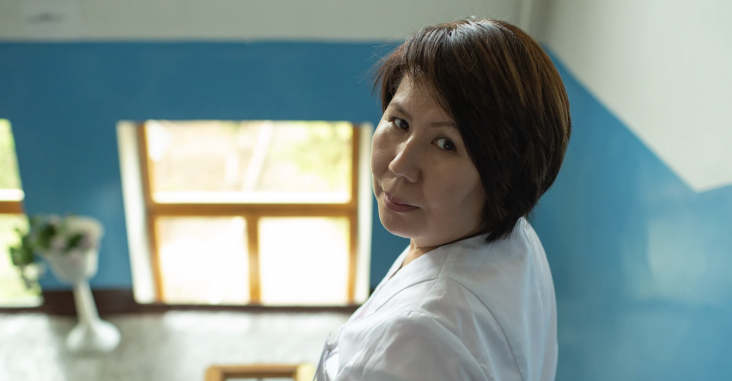Speeches Shim

Providing online psychological support during COVID-19 in Kazakhstan.
COVID-19 has affected everyone’s life and changed every family’s routine in Kazakhstan. The pandemic has been accompanied by health threats, lockdowns, economic woes, and self-isolation and profoundly impacted people’s mental health.
Through this turmoil and constantly changing new normal, it is not unusual for people to experience psychological problems. Many people are visiting psychologists these days, due to the stress associated with coronavirus.
To address the emerging needs for psychological support during the COVID-19 outbreak, USAID’s partner, UNICEF Kazakhstan joined Kazakhstan’s National Centre for Mental Health at the Ministry of Healthcare to launch a website that provides information and serves as a platform for individual online counselling services, meeting the needs of the population for psychological assistance, especially during the pandemic.
Sandugash Kudaibergenova, a psychologist and an online counselor available on the website, explains, “Anyone can access the website and set up an online consultation at a time of their convenience. Usually the consultation is organized through Zoom or WhatsApp. The duration varies from 30 minutes to an hour.” Clients can choose to schedule consultations with the same psychologist again.
Sandugash adds, “At the peak of the outbreak in Kazakhstan, there were a lot of losses, so I delivered a special workshop on dealing with loss.”
Sandugash has a degree in Psychological Sciences, she is one of 58 counselors providing psychological support and assistance to Kazakhstan’s population during the COVID-19 outbreak.
To date, 334 consultations have been conducted online through the website. Emotional disturbance, anxiety and fear are among the most common stressors. Fifteen percent of first-time clients return for additional consultations.
Sandugash notes, “I provide assistance on a range of issues. About 40 percent of my clients have COVID-19-related problems. However, nearly 60 percent of my clients have problems with relationships, aggravation of panic attacks and depression. I receive more requests for emotional assistance. Often from younger people aged 17-30 years. The isolation heightens festering problems, for instance, learning difficulties and coping with stress.”
One of Sandugash’s client’s is a 19-year old. Here’s what she has to say about her personal experience, “For about two-three months, I was very depressed. I couldn’t understand why it was happening. Then I found out about this website and spoke to a psychologist. It helped me process what I was feeling and learn how to prevent feeling like this in the future. I have participated in a few sessions so far and I can already feel the difference. The psychologist asks questions and gives advice that helps a lot and somehow it just gets easier. I think this is a very important initiative that people really need right now.”
The website also provides tips for parents and children on how to relieve stress and anxiety, improve your well-being, and talk with your child during the pandemic.
Addressing the existing demand in professional capacity building and development among psychologists, in May 2020, with USAID’s financial support, UNICEF launched a new page and YouTube channel for school psychologists offering counselling services for case management and supervision under the joint action plan with the Ministry of Education and Science and National Centre for Mental Health of the Ministry of Healthcare. Through this page, recommendations on psychological support for the prevention of COVID-19 secondary impact on parents and children, and practical tips and exercises were made accessible for school psychologists from all 17 regions of Kazakhstan, including remote settlements with limited internet connectivity.
UNICEF has received very positive feedback from school psychologists, who previously lacked the skills and ability to provide remote consultancy services.
Since the launch in April 2020, a total of 90 webinars on numerous topics related to distance psychological support for children and families have been conducted for school psychologists across all regions of Kazakhstan. Webinars have also been made accessible through YouTube and over 20,000 online participants and additional over 54,000 views have been registered to date. By making these resources available online, they are also accessible to school psychologists in remote and rural areas across Kazakhstan.
Sandugash is proud of the work she’s doing to help young people deal with the pandemic. “This initiative is really good because it also motivates psychologists to hone their skills and to better understand clinical psychology. It makes them better psychologists, and more capable of serving their clients.”
USAID has partnered with UNICEF in Kazakhstan to improve risk communication and bolster infection prevention and control efforts to fight COVID-19.

Comment
Make a general inquiry or suggest an improvement.